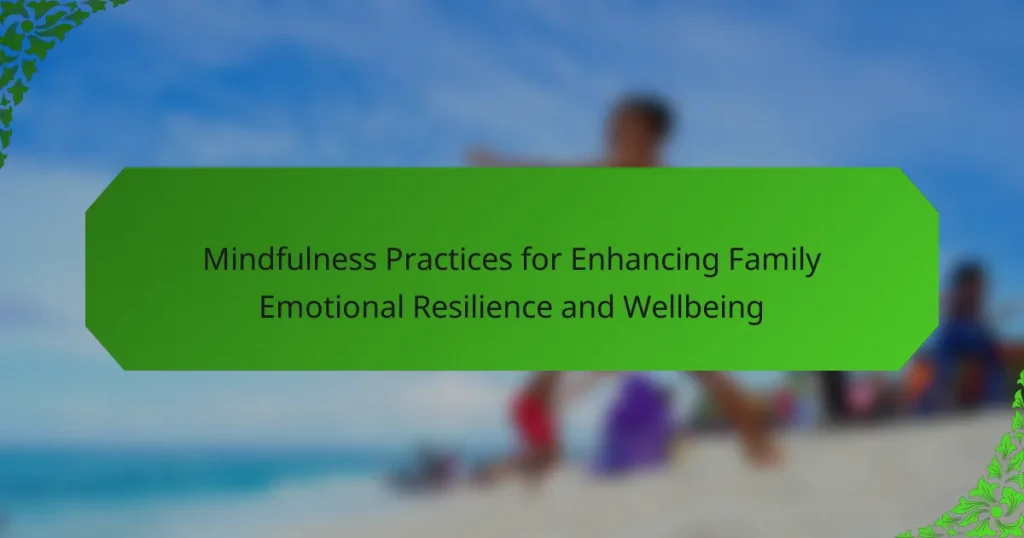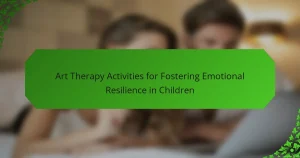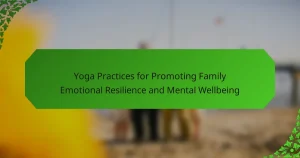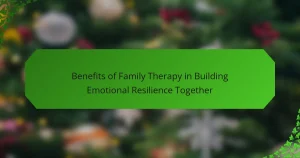Mindfulness practices enhance family emotional resilience and wellbeing by fostering connection and understanding. Key techniques include mindful communication, shared mindfulness sessions, and gratitude practices. Engaging in nature walks promotes physical health and emotional bonding, while exploring unique mindfulness methods can deepen family connections. Cultural influences shape these practices, providing diverse approaches to enhancing family dynamics.
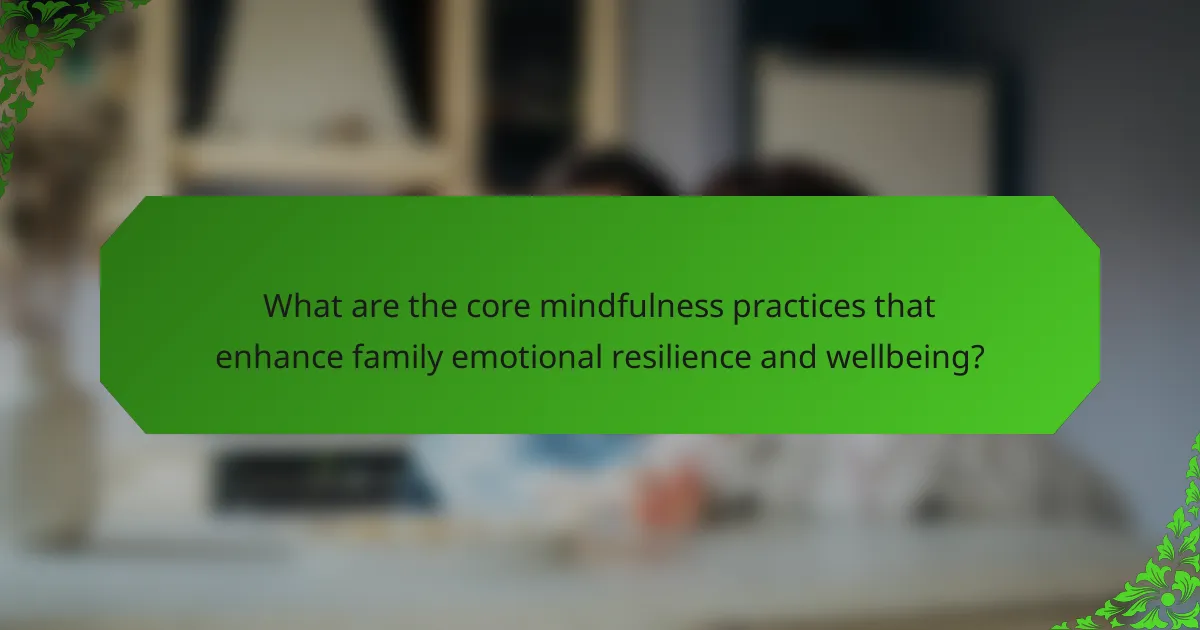
What are the core mindfulness practices that enhance family emotional resilience and wellbeing?
Mindfulness practices enhance family emotional resilience and wellbeing through techniques that foster connection and awareness. Key practices include mindful communication, where family members actively listen and express feelings without judgment. Regular family mindfulness sessions, such as meditation or breathing exercises, create a shared space for emotional support. Engaging in gratitude practices helps families recognise positive aspects of their lives, boosting overall morale. Additionally, incorporating nature walks into family routines promotes physical health and emotional bonding, benefiting resilience.
How does mindfulness improve emotional regulation in family dynamics?
Mindfulness enhances emotional regulation in family dynamics by fostering awareness and promoting empathy. Regular mindfulness practices help family members recognise their emotions, leading to healthier communication. This approach reduces conflicts and cultivates a supportive environment. As a result, families experience improved emotional resilience and overall wellbeing.
What role does mindfulness play in fostering empathy among family members?
Mindfulness significantly enhances empathy among family members by fostering present-moment awareness and emotional connection. Practicing mindfulness encourages individuals to listen actively and respond thoughtfully, creating a supportive environment. Research indicates that mindfulness can increase emotional intelligence, which is crucial for understanding and relating to others’ feelings. As a result, family members become more attuned to each other’s needs, promoting stronger bonds and emotional resilience.
How can mindfulness practices strengthen family communication?
Mindfulness practices can significantly enhance family communication by promoting active listening and emotional awareness. Engaging in mindfulness exercises together fosters a supportive environment that encourages open dialogue. As families practice mindfulness, they develop patience and empathy, crucial for resolving conflicts. Research shows that families who regularly engage in mindfulness activities report improved emotional resilience and well-being, leading to stronger relationships.

What universal benefits do mindfulness practices offer to families?
Mindfulness practices offer families enhanced emotional resilience, improved communication, and reduced stress. These practices foster a supportive environment, promoting empathy and understanding among family members. Regular engagement in mindfulness can lead to lasting positive changes in family dynamics. Research indicates families that practice mindfulness together experience greater emotional well-being and connection.
How do mindfulness practices reduce stress within family settings?
Mindfulness practices significantly reduce stress within family settings by fostering emotional connection and communication. Techniques such as meditation and deep breathing promote calmness, enabling family members to respond to conflicts more constructively. Research indicates that families engaging in mindfulness report lower levels of anxiety and improved relational dynamics. Regular practice cultivates empathy, enhancing understanding and support among family members, which is essential for emotional resilience.
What impact do mindfulness practices have on family relationships?
Mindfulness practices significantly enhance family relationships by promoting emotional resilience and well-being. These practices foster open communication, reduce stress, and improve empathy among family members. Research shows that families engaging in mindfulness report higher levels of satisfaction and connection. Regular mindfulness activities can lead to a unique attribute of shared emotional understanding, strengthening the family bond. As a result, mindfulness serves as a valuable tool for nurturing healthier family dynamics.
How can mindfulness practices improve overall family health?
Mindfulness practices significantly enhance overall family health by fostering emotional resilience and wellbeing. These practices create a shared space for family members to connect, reduce stress, and improve communication. Regular mindfulness activities, such as meditation and deep breathing, can lower anxiety levels and promote a sense of calm. As a result, families experience stronger bonds and improved mental health outcomes. Engaging in these practices together cultivates empathy, patience, and understanding, leading to a more harmonious home environment.
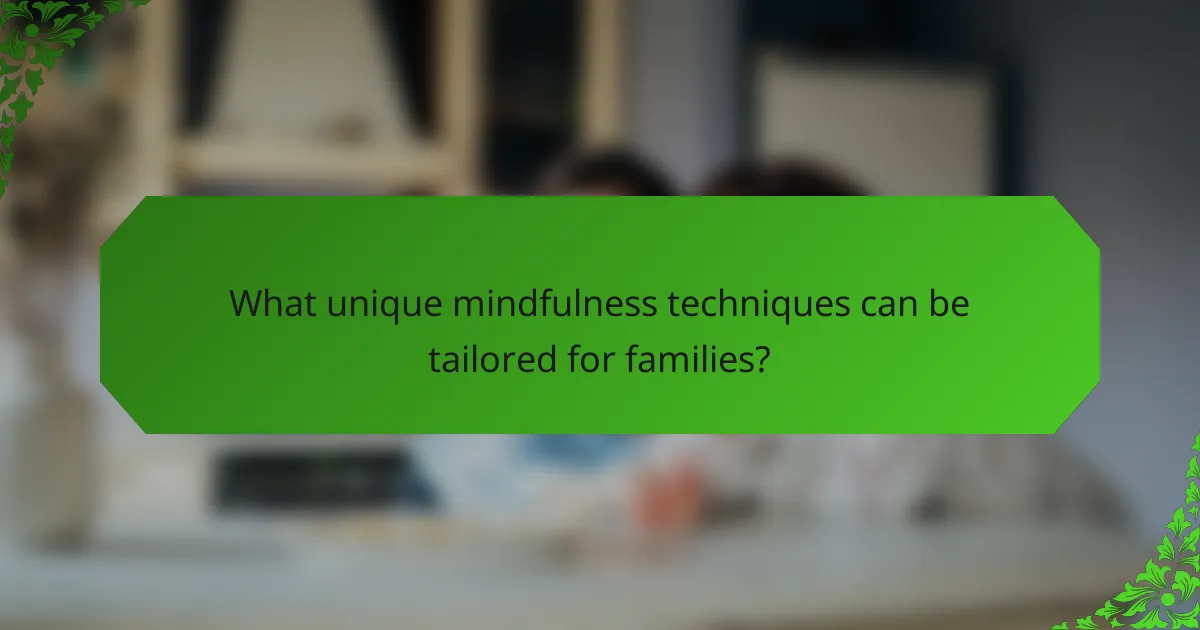
What unique mindfulness techniques can be tailored for families?
Mindfulness techniques tailored for families include shared breathing exercises, nature walks, gratitude journaling, and mindful cooking. These practices foster emotional resilience and strengthen family bonds.
Shared breathing exercises allow family members to synchronise their breath, promoting calmness. Nature walks encourage mindfulness through sensory engagement with the environment. Gratitude journaling cultivates appreciation, enhancing overall wellbeing. Mindful cooking turns meal preparation into a shared, intentional activity, reinforcing connection and presence.
How can guided family meditations enhance collective wellbeing?
Guided family meditations significantly enhance collective wellbeing by fostering emotional connection and reducing stress. These practices promote shared mindfulness, which can lead to improved communication and empathy among family members. Research indicates that families engaging in regular meditation report higher levels of satisfaction and resilience. This unique attribute of guided meditations allows families to navigate challenges together, reinforcing their emotional bonds and creating a supportive environment.
What are the benefits of incorporating nature into family mindfulness practices?
Incorporating nature into family mindfulness practices enhances emotional resilience and wellbeing. Exposure to natural environments fosters stress reduction, promotes connection among family members, and improves overall mental health. Studies show that spending time outdoors can lead to increased feelings of happiness and relaxation. Engaging in mindful activities, such as nature walks or gardening, strengthens family bonds and encourages open communication.
How can creative expression through mindfulness strengthen family bonds?
Creative expression through mindfulness can significantly strengthen family bonds by fostering emotional connection and understanding. Engaging in activities like mindful art, music, or storytelling encourages open communication and shared experiences. This practice enhances emotional resilience, allowing families to navigate challenges together. Mindfulness creates a safe space for expressing feelings, which deepens trust and empathy among family members. As a result, families that practice mindfulness together often report improved relationships and a greater sense of belonging.
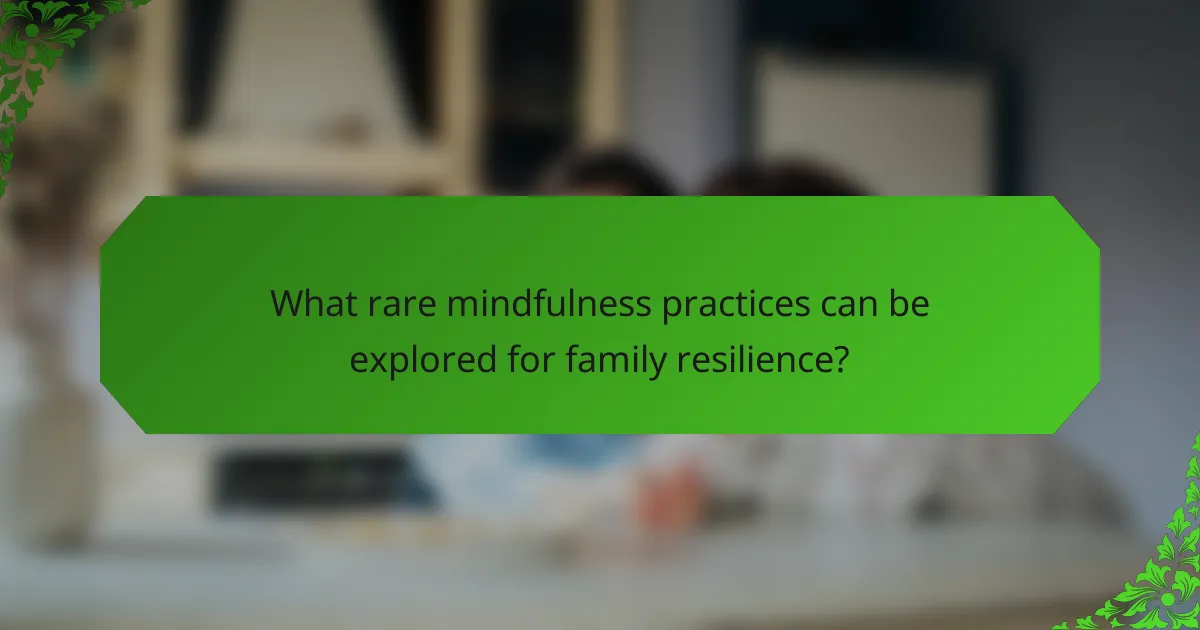
What rare mindfulness practices can be explored for family resilience?
Exploring rare mindfulness practices can significantly enhance family resilience. Techniques such as forest bathing, which involves immersing oneself in nature, promote emotional well-being. Another unique practice is family constellation therapy, fostering understanding of familial dynamics through guided visualization. Additionally, sound baths can create a calming environment, enhancing collective mindfulness. These practices encourage deeper connections and emotional support within families, ultimately strengthening resilience.
How can storytelling as a mindfulness practice enhance emotional connections?
Storytelling as a mindfulness practice enhances emotional connections by fostering empathy and shared experiences. It allows family members to express feelings and thoughts, creating a safe space for vulnerability. This practice strengthens bonds, promotes understanding, and cultivates emotional resilience. Engaging in storytelling together can lead to improved communication and deeper relationships within families.
What are the benefits of intergenerational mindfulness practices?
Intergenerational mindfulness practices enhance family emotional resilience and wellbeing by fostering deeper connections and understanding among family members. These practices promote empathy and communication, allowing different generations to share experiences and perspectives.
Research indicates that families engaging in mindfulness together report improved emotional regulation and reduced stress levels. This collective approach cultivates a supportive environment, helping individuals cope with challenges while strengthening familial bonds.
Additionally, mindfulness practices can address unique family dynamics, enabling members to navigate conflicts more effectively. As a result, families experience increased harmony and cohesion, contributing to overall mental health and wellbeing.
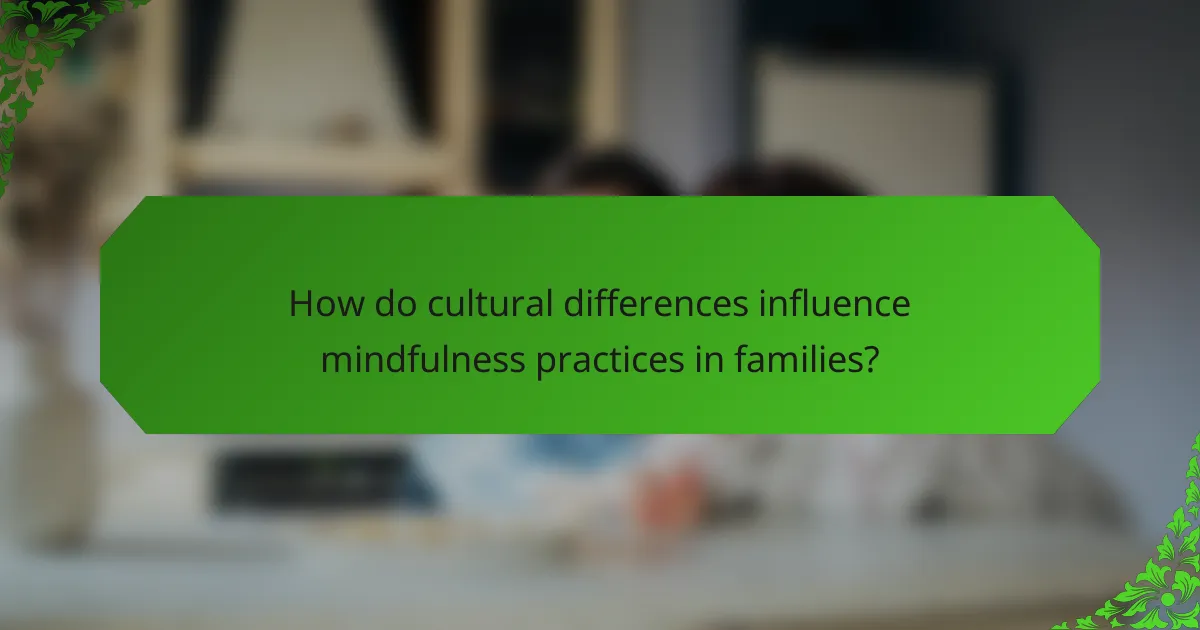
How do cultural differences influence mindfulness practices in families?
Cultural differences significantly shape mindfulness practices in families by influencing values, communication styles, and emotional expressions. For instance, collectivist cultures may emphasise group harmony and shared mindfulness activities, while individualistic cultures might focus on personal mindfulness practices. These variations affect how families engage in mindfulness, fostering emotional resilience and wellbeing uniquely across cultural contexts. Family traditions and rituals also play a crucial role, often integrating mindfulness into daily life, which enhances emotional connections and coping strategies. Understanding these cultural nuances is essential for effective mindfulness implementation in diverse family settings.
What mindfulness practices resonate with families in different cultural contexts?
Mindfulness practices that resonate with families across cultural contexts include storytelling, nature walks, and communal meals. These practices enhance emotional resilience and wellbeing by fostering connection and presence.
For example, in Indigenous cultures, storytelling serves as a means of sharing wisdom and values, reinforcing family bonds. In many Asian cultures, nature walks provide a calming environment that encourages reflection and mindfulness. Communal meals, prevalent in Mediterranean cultures, promote togetherness and gratitude, enhancing family dynamics.
Research shows that these practices can lower stress and improve communication among family members, making them effective tools for emotional growth. Families can adapt these practices to fit their unique cultural backgrounds while benefiting from the shared goal of enhancing wellbeing.
How can families navigate cultural barriers through mindfulness?
Families can navigate cultural barriers through mindfulness by fostering open communication and empathy. Mindfulness practices, such as meditation and active listening, enhance emotional resilience and promote understanding. These practices encourage family members to be present and aware, reducing stress and fostering connections. Engaging in shared mindfulness activities can create a safe space for discussing cultural differences, ultimately strengthening family bonds and promoting well-being.
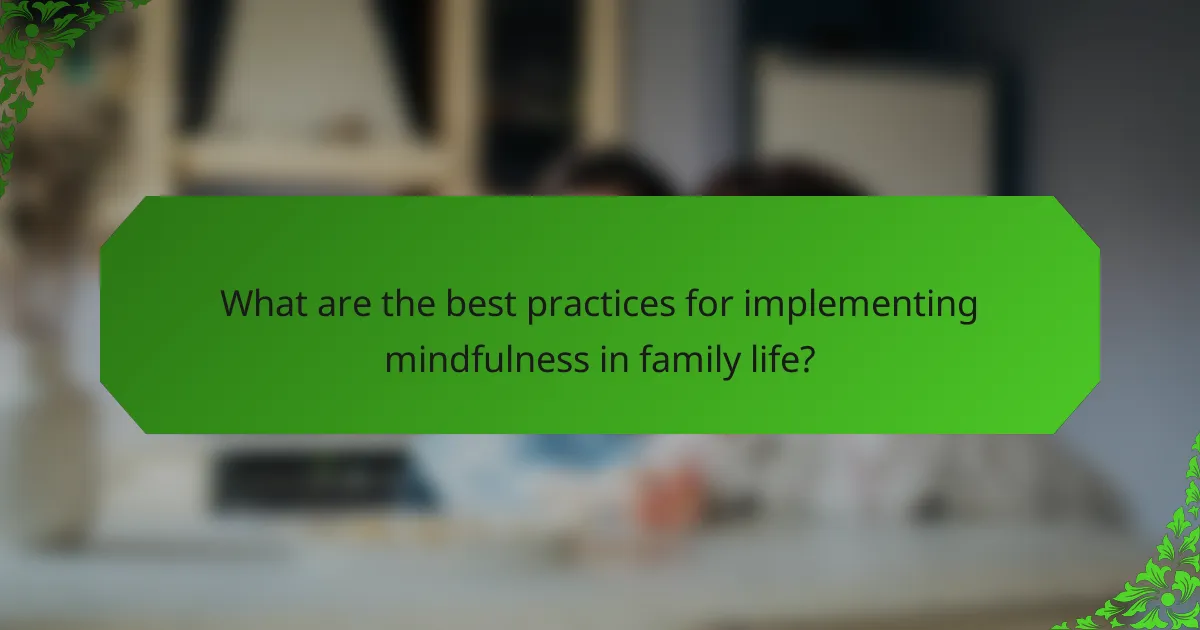
What are the best practices for implementing mindfulness in family life?
Mindfulness practices enhance family emotional resilience and wellbeing by fostering connection and understanding. Families can implement these practices through regular mindfulness exercises, open communication, and shared activities.
1. Establish a daily mindfulness routine, such as meditation or deep breathing exercises, to promote emotional awareness.
2. Encourage open discussions about feelings, helping family members express themselves without judgment.
3. Engage in mindfulness-based activities together, like yoga or nature walks, to strengthen bonds and cultivate presence.
4. Model mindful behaviour by practicing patience and active listening during family interactions.
These practices can significantly improve family dynamics and emotional health.
How can families create a consistent mindfulness routine?
Families can create a consistent mindfulness routine by integrating simple practices into daily life. Start with short, guided mindfulness sessions that fit into family schedules. Designate specific times for these practices, such as after breakfast or before bed, to establish a routine. Encourage open discussions about feelings and experiences during these sessions to enhance emotional resilience. Incorporate mindfulness activities like nature walks or mindful eating, which can foster connection and awareness. Consistency in practice strengthens family bonds and promotes overall wellbeing.
What common mistakes should families avoid when practicing mindfulness?
Families should avoid common mistakes like rushing the process, neglecting individual needs, and lacking consistency. These errors can hinder the effectiveness of mindfulness practices. Rushing may lead to superficial engagement, while ignoring individual preferences can create resistance. Consistency is crucial for building emotional resilience; without it, families may struggle to integrate mindfulness into daily life.
What expert insights can enhance family mindfulness practices?
Expert insights can significantly enhance family mindfulness practices by fostering emotional resilience and wellbeing. Incorporating regular family mindfulness sessions can improve communication and strengthen relationships. Research shows that families practicing mindfulness together report higher levels of emotional awareness and lower stress levels. Techniques such as guided meditations, mindful breathing, and gratitude exercises can be tailored to suit all family members. Additionally, creating a designated space for mindfulness activities can reinforce commitment and consistency within the family routine.
